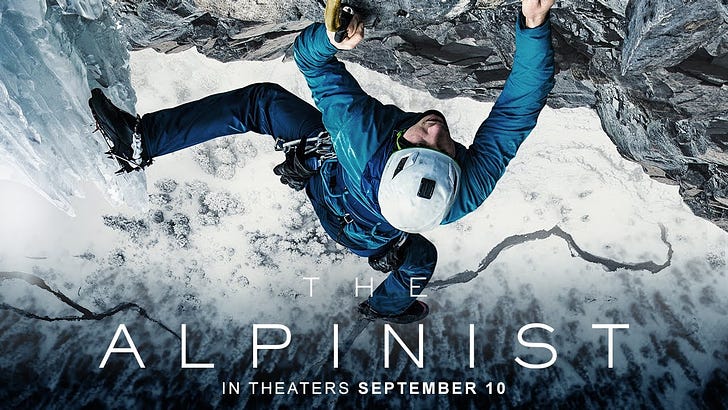A short post this week, more an idea than an article.
After watching The Alpinist this Saturday, I’ve found it hard to think about anything but the relative importance of quality and quantity.
The movie introduces Marc-André Leclerc, a 23-year-old Canadian who climbs challenging rock/ice/snow-covered mountains without a rope. Even Alex Honnold, the legendary free soloist who completed a ropeless ascent of El Capitan, pointed out in the movie that Leclerc’s ascents were more risky than his own because ice and snow are less reliable than rock.
At the beginning of the movie, I thought Marc-André was a madman: a daredevil with a death wish. I knew that he understood the risk he was taking, and to take such an obviously, quantifiably massive risk seemed to be irrational and even callous, given the impact that his death could have on his mother and his girlfriend.
But by the end of the film, my thinking had changed dramatically.
I came to understand Marc-André’s life as a remarkably brave defense of quality over quantity.
Yes, his climbing was statistically likely to reduce the number of years that he lived. But it also allowed him to maximize his joy, connectedness, inspiration, and love in each of the years of his life.
Honnold thought that Marc-André’s risk taking came from his “spiritual commitment to adventure”; over the past day, I can’t seem to think of much else other than the depths of that commitment, and what it might mean for how I live my life.
It’s made me think a lot about how much easier it is to optimize for quantity, rather than quality. How many pounds you lifted, now how precise your form. How many words you wrote, not the impact they had. How many people you hired, not how well you’ve connected with each one. How many items you ticked off of your to-do list, not how many of them actually mattered.
Because it’s easy, and because it gives me the illusion of control, I focus too much on optimizing things that I can measure. Maybe I should take Marc-André as inspiration to do the opposite: to relax into life, to seek out flow, and to pay more attention to quality, over quantity.
As Taleb said in The Black Swan:
We love the tangible, the confirmation, the palpable, the real, the visible, the concrete, the known, the seen, the vivid, the visual, the social, the embedded, the emotionally laden, the salient, the stereotypical, the moving, the theatrical, the romanced, the cosmetic, the official, the scholarly-sounding verbiage (b******t), the pompous Gaussian economist, the mathematicized crap, the pomp, the Académie Française, Harvard Business School, the Nobel Prize, dark business suits with white shirts and Ferragamo ties, the moving discourse, and the lurid. Most of all we favor the narrated…
In other words, we are naturally shallow and superficial—and we do not know it.
And, well, maybe it’s time to start figuring it out.
If you liked this post, you’ll also like:
-Christian




